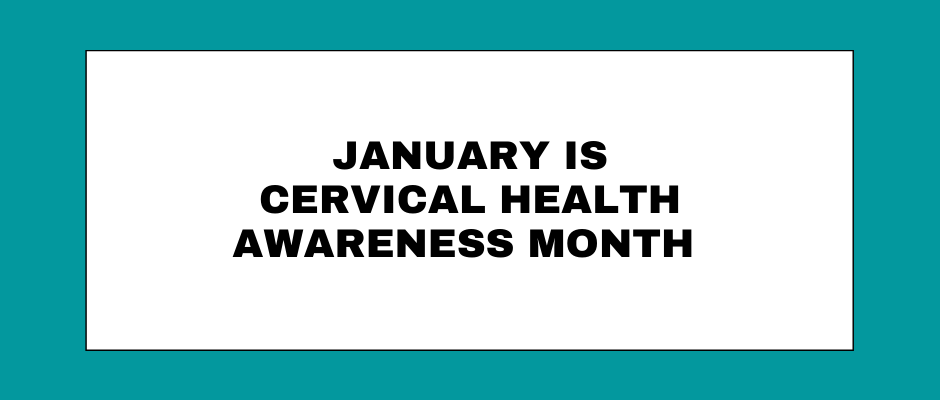
January is Cervical Health Awareness Month. This month, various organizations embark on campaigns geared towards increasing awareness and public education on cervical cancer in their communities, encouraging testing and vaccinations and providing support for survivors of cervical cancer.
In 2018, the World Health Organization reported that an estimated 570,000 women were diagnosed with cervical cancer worldwide and about 311,000 women died from the disease. And in spite of various effective cancer treatment services and screening inventiveness tailored for early detection, cervical cancer, although one of the most preventable cancers, remains the most common cause of cancer-related death amongst women in over 42 countries and is the 4th most common cancer in women. In the United States, more than 13,000 women are diagnosed with cervical cancer every year, leading to more than 4,200 deaths.
Cervical cancer is a malignant cell cancer of the cervix (the lower part of the uterus which connects the vagina with the main body of the uterus).
A large percentage of cervical cancer cases are usually caused by human papillomavirus (HPV).
HPV is the most common sexually transmitted infection in the United States, and a large percentage of sexually active people will have an HPV infection at some point in their lives. HPV can be high-risk (oncogenic) or low-risk (non-oncogenic), depending on whether they put a person at risk of cancer.
The International Agency for Research on Cancer (IARC) reports that 13 HPV types can cause cervical cancer. Although an HPV infection is not tantamount to cervical cancer, it can linger over a period of time and otherwise turn normal cells into abnormal ones, resulting in cancer. This occurs when a body’s immune system cannot get rid of an oncogenic HPV infection.
Because cervical cancer grows slowly and there are usually almost no identifying signs or symptoms in its early stages, it is important that women get regular screenings. When detected in its early stages, cervical cancer is highly treatable. Research shows that more than 15% of cervical cancer cases are in women who haven’t been getting regular screenings
Due to the fact that a large percentage of cervical cancer cases has been linked to an HPV infection, the HPV test has been approved as a screening test for cervical cancer. It could be a primary HPV test, or a co-test, where the HPV test and the pap smear are done simultaneously to screen for cervical cancer.
The pap test, which can detect changes in cervical cells which may suggest cancer may develop in the future, is also an effective and quite proactive option for screening. The pap smear started in the 1950s and since its introduction, cervical cancer deaths, especially in the United States have fallen by more than 60%.
A pap smear involves collecting cells from the cervix. The samples are then examined to look for elements in the cells that could indicate cancer or pre-cancer.
According to Dr. Raegan McDonald-Mosley, MD, MPH, CEO of Power to Decide, all women starting at age 21 should go for a pap smear test every 3-5 years, depending on the results, as recommended by the U.S. Preventative Services Task Force.
She pointed out that it is not unusual for fear to cripple some women into not going in for screening but encourages women to get over this fear.
“In general, pelvic exams are not extremely painful. What you might experience is a slight discomfort or cramping when the speculum is inserted,” she says. Dr. Raegan also notes that the existence of physiological or psychological trauma like rape or a history of sexual assault can make the test painful for some women. In such circumstances, she advises that the patient should mention this to their service provider and the service provider can, in turn, allow the patient to insert the speculum by themselves, guiding them through the process.
Many women usually do not know what to expect during screening for cervical cancer, but Dr. Raegan explains that although reaction differs from person to person, on average, what one might experience is a momentary discomfort and just a little pressure and occasionally, spotting. But in general, you can have your screening done and continue about your business for the day.
For a lot of women, a visit to their sexual health provider can make them quite nervous. Here, Dr. Raegan notes that the patient can bring an escort if they are uncomfortable. “On a visit to your provider, you can go along with a trusted confidante to ease your discomfort. It could be a sister, friend or partner.” She also notes that with the COVID-19 restrictions, it might be difficult to visit with an escort, but a simple solution to this can be having your confidante call in via FaceTime. She also advises that patients write down their health questions before a visit to ensure that they don’t miss out on raising important health concerns with their provider.
Dr. Raegan also encourages going for annual well-woman exams every year to address every other concern women may have regarding their health. “Even if you have no health concerns, going for your wellness exam is extremely important,” she says, “A visit to your provider doesn't have to be solely for a pap smear screening or the HPV test. Your wellness exam can include breast exams and address other areas of your life like birth control, nutrition, exercise, pregnancy intentions, and a lot of other things.”
Talking to Dr. Raegan about the importance of cervical cancer screening was both validating and very encouraging. I was diagnosed with polycystic ovarian syndrome (PCOS) when I was 18. And for over four years, I was carelessly fixated on fixing what I deemed to be issues with my weight and skin, paying no mind at all to every other health concern that I could be at risk of as a result of my condition. At 24, I am committed to paying better attention to my health, and for the past year, my annual well woman exams have been on the top of my list. And while there is no known link between cervical cancer and PCOS, it does make me feel a whole lot better, not to mention safer, knowing that I am prioritizing my sexual health.








